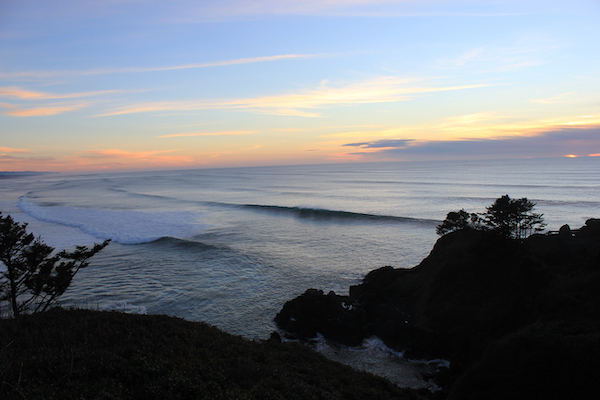
Most Oregon coasties will tell you that September is one of the more cherished months of the year. That time when the tourists start to dwindle, the northerly winds die down turning easterly and grooming early fall swells to the surfer's delight. Salmon are coming into the rivers and the weather is at its best all year. But for one of the surfer's most beloved months of the year, this September brought a plague of health advisories for water quality contact at some of the most popular beaches in our state. From Short Sands to Mill Beach, over 11 beaches tipped the bacteria limit for health advisories in September issued by Oregon Health Authority's Beach Monitoring Program, leaving many beachgoers asking, "Who let the poop out?"
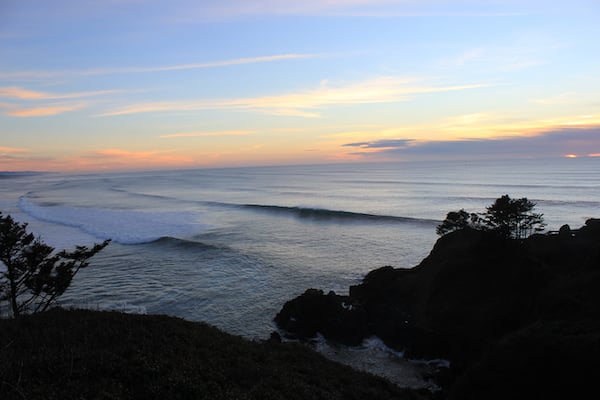 September beckons swells to surf and water quality warnings
September beckons swells to surf and water quality warnings
So what's the deal with the high bacteria and poopy beach water quality this September?
The short answer is it rained this September and poopy stuff flows with rain to the beach. We call this lots of stuff like runoff, stormwater, etc. but generally speaking, it's the rain and all the $h#! that washes out with it. The reason we – ocean users like surfers and beachgoers – care is that it rains a lot in Oregon...and the Oregon Health Authority's Beach Monitoring Program doesn't monitor during the fall and winter months. The program, which will conclude seasonal testing at the end of September, will essentially be winding down when beachgoers and ocean users are at the greatest risk. This isn't a new story – this is what our Surfrider Chapters have known for decades and one of the reasons we take monitoring into our own hands with 7 year-round volunteer-run water quality monitoring programs (more on that here). But this month's mass of advisories has coastal communities and ocean users concerned – understanding why, when and where these bacteria spikes happen can give us clues to solutions.
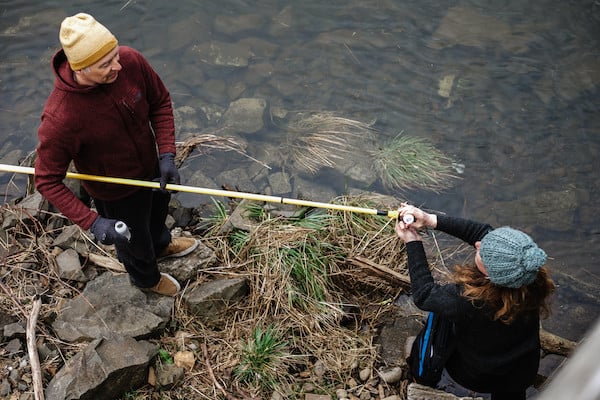 Surfrider volunteers sample a coastal creek that flows on to the beach on the north coast. Photo: R. Gold Photography
Surfrider volunteers sample a coastal creek that flows on to the beach on the north coast. Photo: R. Gold Photography
No State beach monitoring occurs during the wet season, when beachgoers and surfers are at greatest risk
The news of these health advisories came shortly after an investigation this summer where Oregon was touted as one of the cleanest state's in the nation for beaches with fewer advisories than states like California and Florida. The article and reporter did actually do a nice job of highlighting some of our concerns in Oregon, but the data story was more of a solid thumbs up to Oregon beaches. However, given the investigation compiles data from various state's water quality monitoring programs, which in Oregon does not occur in the rainy months, one might ask, "Is the data and investigation telling us a false narrative of mostly clean beaches?" With our State's monitoring program this year extending well beyond the usual cut off date of Labor Day and into a rainy September, a new picture emerges for water quality along the Oregon coast – one of likely greater health risk exposure. As the state's beach monitoring program winds down for season, there will be an absence of advisories to warn beachgoers in the fall and winter...just one shortfall of Oregon not funding our State's Beach Monitoring Program (we advocate federally for that funding – more on that here).
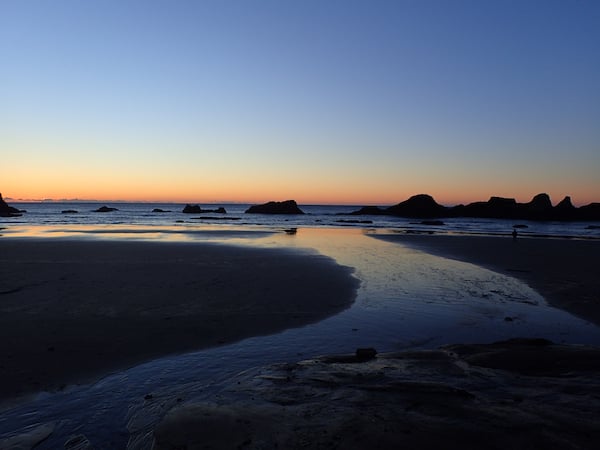 Small creeks like this one at Seal Rock are generally the vectors carrying bacteria from upland sources to the beaches
Small creeks like this one at Seal Rock are generally the vectors carrying bacteria from upland sources to the beaches
The September Squirts:
How a little rain packs a powerful punch
What exactly happened this September, why was it worse this year? Why the outbreak of bacteria and health advisories when for coastal residents, it seemingly didn't rain that much. And, not that much, is exactly the point. What we experienced was a very concentrated "first flush". The first flush event is a pretty common phenomenon as the dry season concludes with the first big rain that "flushes" all of what's been accumulating in our urban and rural environments – everything from that dog poop that didn't get picked up to pesticides, oil, grease, etc. In highly urbanized places like LA County, this can be a pretty gnarly event, bringing literally tons of litter, plastic and other types of debris from the urban environment. But our first flush this September was more like a series of squirts – a tenth of an inch of rain here, a third there, rarely exceeding a quarter inch at a time. Those successive relatively minor rainfall events, were just enough to start flushing, but due to the low volume of rain, the bacteria flush was really concentrated. The result, health advisories at nearly every beach sampled in Oregon with a freshwater creek that flows across it.
No Health Advisories for Contaminated Freshwater on Beaches
And if the State's Beach Monitoring Program were to be issuing health advisories for the freshwater sampled in those creeks at the beach, we'd have seen A LOT more health advisories this September. In fact, from September 1-18 there would have been over 20 additional health advisories based on the number of creeks that exceeded health limits for recreational water contact through the state's beach monitoring program.
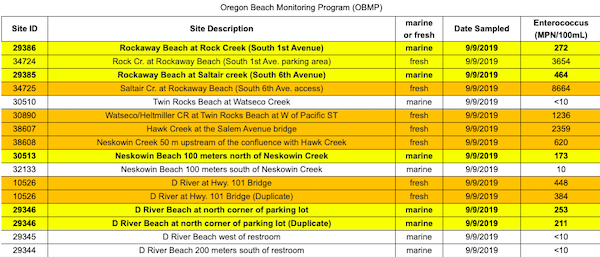 The above table shows the results from the testing performed by the Oregon Beach Monitoring Program on September 9th. All of the yellow highlighted samples exceeded the health advisory limit for recreational contact, but none of the samples indicated 'freshwater' had a health advisory issued, despite known contamination.
The above table shows the results from the testing performed by the Oregon Beach Monitoring Program on September 9th. All of the yellow highlighted samples exceeded the health advisory limit for recreational contact, but none of the samples indicated 'freshwater' had a health advisory issued, despite known contamination.
So, here is the second biggest shortfall of not funding the State's Beach Monitoring – health advisories are not issued for freshwater sampled at beach creeks outfalls, despite exceeding water quality limits and often greater public exposure than ocean water.
What can we take away from all of this? September 2019 has been a good indicator of some of the downfalls of not properly funding our State's Beach Monitoring Program. It also further reinforces Surfrider's Blue Water Task Force Program and all the related Clean Water Initiative programs, campaigns and activities our Surfrider volunteers invest their time and energy in – a shout out to all those beach volunteer warriors out there!
Here's how you can help:
Advocate for state funding of Oregon's State Beach Monitoring Program
Tell your elected officials you want year-round monitoring, when beachgoers and ocean users are at the greatest risk. Our greatest health risks and exposure at beach creeks and freshwater outfalls have known levels of contamination monitored by the state's program, yet the state isn't funded to actually issue a health advisory on the contamination (crazy, right?). Oregon should invest in the state's monitoring program not only to fill these gaps and protect public health, but also because relying on consistently budget-vulnerable federal funding puts the entire program, and your health, at risk. We don't want to demonize the State's Monitoring Program, on the contrary we are strong partners and supporters of the program, we just want to see the State wholly fund these shortfalls.
Volunteer and/or Support Surfrider's Blue Water Task Force Program
Surfrider is out there year round because the state and no other monitoring is when we care the most...and we'd rather do it ourselves and know before we go surf or to the beach than wait on someone to do it for us. The volunteer monitoring program did precede the state's monitoring program and in many way is much more extensive. Volunteering in Oregon to help us sample not only gets you to the beach, but it helps us keep others informed; and, our longterm monitoring and data really does help local communities investigate for water quality solutions. Further, our volunteers raise 100% of the funds to support these labs so if you don't have the time to volunteer, supporting one of our labs financially through a sponsorship is an amazing way to contribute - check out how Wilsonville Subaru partnered with our Portland Chapter to support our North Coast water quality lab...groovy story coming soon on that, but an idea for corporate supporters out there as well!
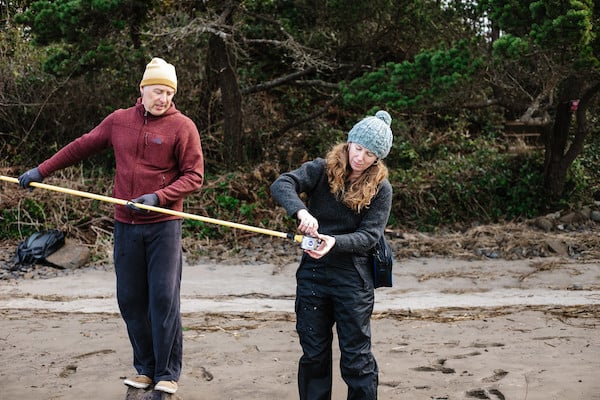 North Coast Surfrider volunteers Jesse Jones and Doug Mitchell collect field samples for our Surfrider's north coast Blue Water Task Force program. Photo: R. Gold Photography
North Coast Surfrider volunteers Jesse Jones and Doug Mitchell collect field samples for our Surfrider's north coast Blue Water Task Force program. Photo: R. Gold Photography
